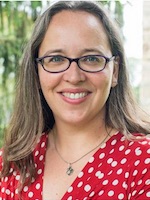Karen L. Masters: Candidate for Nominating Committee

Affiliation: Haverford College
Position/Title: Associate Professor of Astronomy and Physics
PhD institution: Cornell University (2005)
Areas of scientific interest:
- Extragalactic astrophysics
- Galaxy morphologies, galaxy evolution, galaxy distances
- Astronomical surveys
- Optical spectroscopy and imaging
- Citizen science techniques for data analysis (Galaxy Zoo)
- Science learning via citizen science engagement
AAS and/or Division leadership positions and dates:
- Member, Education Committee, AAS (2018 – present)
- Member, AAS (2003 – present)
Other relevant positions, experience, and dates:
- Member, Annie Maunder and Patrick Moore Medals Committee, Royal Astronomical Society (2017)
- Spokesperson, Sloan Digital Sky Survey-IV (2016 – 2021)
Statement:
Professional societies are run by and for their membership. The Nominating Committee of the AAS has a responsibility to consider and encourage representation from the full diversity of our membership to stand for roles in the leadership of our society. My experiences working in different settings, working across the diverse membership of the Sloan Digital Sky Survey, and engaging with the diverse volunteers in Galaxy Zoo have taught me to recognise and value diversity in all its dimensions. As a member of the Nominating Committee I will consider representation from the many different types of institutions we work in, as well as our different roles within the field of professional astronomy all of which contribute to our mutual success. On top of this diversity, of course I will pay attention to representation from the many different and intersecting demographics within our society. I firmly believe that a leadership which does not reflect the diversity of its membership cannot succeed nearly as well as one that does, so ensuring diversity in who stands for nomination to AAS leadership isn't just the right thing to do in a fair and just society, but will also be more likely to ensure the success of the AAS in its mission to enhance and share humanity's scientific understanding of the universe.

